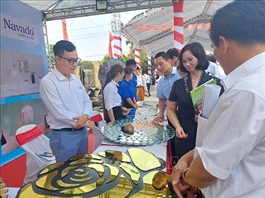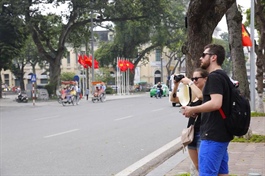Viet Nam, China negotiate phytosanitary requirements for fruit exports
Viet Nam, China negotiate phytosanitary requirements for fruit exports
Viet Nam and China are negotiating to develop phytosanitary protocols for eight kinds of Vietnamese fruits exported to China.

Currently, Viet Nam has 11 kinds of fruits that are exported via official channels to China. Of these fruits, Viet Nam has signed with China protocols on phytosanitary requirements for three kinds, including mangosteen, passion fruit and durian.
Meanwhile, Viet Nam has not yet signed the protocols on phytosanitary requirements for eight other exported fruits, including bananas, mangoes, litchi, longans, watermelons, dragon fruit, jackfruits and rambutans.
“Viet Nam's Plant and Animal Quarantine Department hopes that the two countries sign the protocols on phytosanitary for these eight fruits. Based on the protocols, the department can manage production, packaging, processing and exporting establishments to standardise products. Thus, Viet Nam will also propose China to reduce the frequency of inspection for export fruits to this neighbouring market," said Vuong Ich Ngu, deputy director of the Plant and Animal Quarantine Department.
Luong Ngoc Quang, from the Department of International Cooperation and Communication, the Plant Protection Department, said, "The Plant Protection Department is coordinating with the General Department of Customs of China to complete negotiation about technical exchanges and development of protocols on phytosanitary for the eight fruits."
The signing of the protocols will bring many positive business results in the long term because all trading activities for those fruits will be through a contract, according to Quang. That will help stabilise output and prices. If the fruits do not meet the quality requirements as signed in the contract, partners can refuse to receive the goods.
“To promote the official export of fruit products to China, Viet Nam needs to build eligible growing areas and packaging facilities and strictly manage the use of pesticides. The Plant Protection Department has recommended these issues and has been enhancing training for localities," Quang said.
At a recent online meeting on quarantines for Viet Nam's fruits exported to China between authorities of Viet Nam and China, Ngu also said that the rate of shipments under inspection depends on the infection status of fruits and the inspected rate can be adjusted depending on the level of infection at each moment.
“The inspection must be based on the specific type of fruit and the risk of having a pest," Ngu said.
"For example, with mangosteen fruit, after Viet Nam and China have signed the protocol on phytosanitary requirements, the Plant and Animal Quarantine Department must inspect the domestic enterprises and the products to meet requirements. If the enterprises implement the phytosanitary requirements, the rate of inspected shipments will reduce to 30 per cent, if not, the rate will increase to 80 per cent, and even to 100 per cent."
To export fresh fruit to the Chinese market, manufacturers and exporters must comply with regulations on phytosanitary, food safety and traceability.
Shipments from growing areas or packaging facilities that have not registered to have codes from the Ministry of Agriculture and Rural Development are not licensed by the General Administration of Customs of China (GACC) to import to China.
The growing area code is a necessary and mandatory condition to export fruits to China and is also one of the factors for product traceability.
Besides that, if China discovers infected consignments, it may refuse to import them, destroy them or apply phytosanitary treatment.
Meanwhile, China will refuse or destroy all fruit imports having residue of pesticides or other toxic substances exceeding China's health and safety standards.
At the same time, GACC will immediately notify the Ministry of Agriculture and Rural Development and may suspend imports from that growing area or enterprise to China, or even that kind of fruit from Viet Nam, depending on the situation.

























